| Srl | Item |
| 1 |
ID:
131846
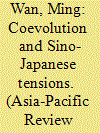

|
|
|
|
|
| Publication |
2014.
|
| Summary/Abstract |
Unlike those who blame the other side or structural forces beyond one's control for the current Sino-Japanese tensions, this paper offers a theoretical insight about the coevolution between China and Japan to explain why the two Asian great powers that had a better relationship in the past are now experiencing greater tensions when their much closer economic and people-to-people ties should facilitate greater cooperation. The two nations have coevolved over millennia with increasing intensity over time. They avoided serious tensions in the 1970s-1990s partly thanks to each being situated in a different niche. But that separation has diminished in a globalizing world and the two countries are becoming more integrated, which has triggered a backlash. The earlier generation of proponents of Sino-Japanese friendship succeeded in forging strong economic and social ties, but the current generation finds it difficult politically and psychologically to manage the new reality in their relations.
|
|
|
|
|
|
|
|
|
|
|
|
|
|
|
|
| 2 |
ID:
097228
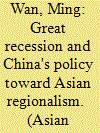

|
|
|
| 3 |
ID:
187971
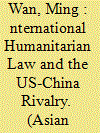

|
|
|
|
|
| Summary/Abstract |
The US government has shifted strategic focus from war on terror to great power contest with China and Russia. But there has not been corresponding thinking about the role of international humanitarian law (IHL) and the law of war (LOW) in the United States or China. Both IHL and human rights law (HRL) originated from Western legal traditions and advantage the United States and the West. China had to adapt and is now challenging the West-dominated international order, a major source of its tension with the United States. Both China and the United States invoked the Geneva Conventions against each other during the Korean War. The war took place seven decades ago, and much has changed since then. But it is the only precedent between the two great powers. LOW provides a structure for managing conflict between the great powers. In turn, a rivalry between the two greatest powers would make IHL narrowly based on national interests and weaken its linkage to human rights.
|
|
|
|
|
|
|
|
|
|
|
|
|
|
|
|
| 4 |
ID:
192160
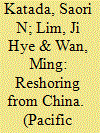

|
|
|
|
|
| Summary/Abstract |
This article examines the Japanese and South Korean governments’ reshoring and diversification policies of supply chains especially away from China since the early 2010s, with particular attention to the measures taken under the 2020–21 pandemic. The article also explores how much Japanese and South Korean reshoring from China, a subset of foreign economic policy, counts as economic statecraft as a deliberate government attempt to achieve geopolitical objectives using ‘economic’ means. One would expect these governments, which innovated proactive industrial policies and guided the private sector to catch up with developed economies in the 20th century, to have an easy time encouraging businesses to re-shore. While these two governments have employed various policy instruments to shift their economic dependence away from China, there is only limited success in motivating businesses to return to their homeland. This leads to an intriguing departure in our understanding of the capacity of those two Asian nations, which used to be considered prototypical ‘developmental states’ where governments have significant influence over business behaviour. This research brings more nuance and complexity to prevailing state-as-unitary-actor assumption of the economic statecraft literature and advocates closer attention to domestic sources of foreign economic policy.
|
|
|
|
|
|
|
|
|
|
|
|
|
|
|
|
| 5 |
ID:
078349
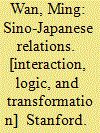

|
|
|
|
|
| Publication |
Stanford, Stanford University Press, 2006.
|
| Description |
xvii, 477p.
|
| Standard Number |
0804754594
|
|
|
|
|
|
|
|
|
|
|
|
Copies: C:1/I:0,R:0,Q:0
Circulation
| Accession# | Call# | Current Location | Status | Policy | Location |
| 052530 | 327.5105209049/WAN 052530 | Main | On Shelf | General | |
|
|
|
|
| 6 |
ID:
105314
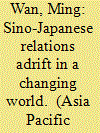

|
|
|
| 7 |
ID:
079073


|
|
|
|
|
| Publication |
2007.
|
| Summary/Abstract |
This paper examines US, Japanese, and European political economy approaches to China, and their effect on US-Japan and US-EU relationships. Great powers with a greater security concern in dealing with another major country care more about power while those with less of a concern are preoccupied with calculations for wealth. China's rise and its actions have posed a far greater security challenge to the United States and Japan and are driving the two countries closer together. The political economy game involving China reveals a dominant welfare motive among the advanced market economies. The ambition to transform China politically has diminished. China's integration into the global market makes a relative gains approach difficult to implement. Globalization simply limits the ability of a state to follow a politics-in-command approach in the absence of actual military conflict, which explains why the political economy approaches of the United States, Europe, and Japan are not that different in the scheme of things. China's own grand strategy to reach out to the world to outflank the US-Japan alliance has also contributed to a divergent European policy toward China although there are severe limitations to Beijing's ability to drive a wedge between the United States and Europe.
|
|
|
|
|
|
|
|
|
|
|
|
|
|
|
|